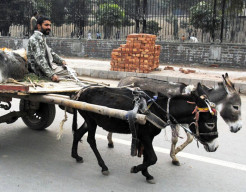
More than 23,000 public transport vehicles, including buses and vans, use gas-filled cylinders to run their engines and there is no government body that keeps a check on the quality of the equipment.
In light of the inferno caused by the leakage of the CNG cylinder in a bus in Hyderabad on Wednesday, questions need to be raised on how safe the public really is when it uses this transport.
“Thousands of people literally sit on time bombs every day,” said the head of the National Forum of Environment, Naeem Qureshi. “CNG cylinders are commonly fitted under the back seats of buses and they are not manufactured in factories, but in small workshops.” His organisation has scrutinised the safety of such CNG cylinders before.
“A cigarette, matchstick or a short circuit will be enough to ignite the cylinder,” he said. “Our study suggests that out of the 3.2 million CNG vehicles, almost 35% are using poor quality cylinders.” With the increase in the price of diesel, many public transporters have switched to CNG, which is cheaper. In the last six months alone, around 15,000 buses and coaches have been fitted with the gas system.
Not many people know, but everyone is required by law to have their CNG cylinders checked from the Hydrocarbon Development Institute of Pakistan (HDIP) once in five years, Qureshi said. “But who cares? Roadside mechanics are fitting the cylinders in heavy vehicles. This job is supposed to be done by engineers.”
Cars running on gas get the cylinders installed from dealers who offer warranties. In cars such as the Alto or Civic, the wiring or internal systems do not need to be changed, but heavy vehicle engines made exclusively for diesel have to be completely altered, say industry officials.
Police investigating the Hyderabad incident said fire was caused by faulty wiring. SHO Adam Khan said the fire engulfed the van in a matter of minutes. “There was no escaping it. We had to cut the skeleton of the van to take the charred bodies out.”
The president of the Karachi Transport Ittehad, Irshad Bukhari, was busy pacifying television reporters on the phone as he spoke to The Express Tribune. “I will not defend the bad ones among us,” he said. “A lot of transporters have fitted poor quality cylinders. The authorities need to stop them.”
He said the HDIP must issue permits to people who choose to fit CNG cylinders in their buses. “But there is also a resource constraint for us. First, the diesel has been made so expensive and then we spend Rs200,000 on the systems.”
There haven’t been many reported incidents of CNG leaks killing people like the case of the LPG (liquefied petroleum gas) bottles.
HDIP’s general manager in Karachi, Habibur Rehman, was not available for comment. The HDIP lab in Korangi is closed most of the year, people at the facility said.
Published in The Express Tribune, December 9th, 2011.
COMMENTS (1)
Comments are moderated and generally will be posted if they are on-topic and not abusive.
For more information, please see our Comments FAQ

1729499714-0/Chappell-Roan-(1)1729499714-0-165x106.webp)

1729499458-0/snoop-(1)1729499458-0-165x106.webp)













It is very important for the nation to check their CNG cylinders (using in transport) by Hydrocarbon Development Institute of Pakistan (HDIP).. I think many people don't know about the place of HDIP. Also it is my advise to open some centres for the checking of CNG cylinders at least in big cities.